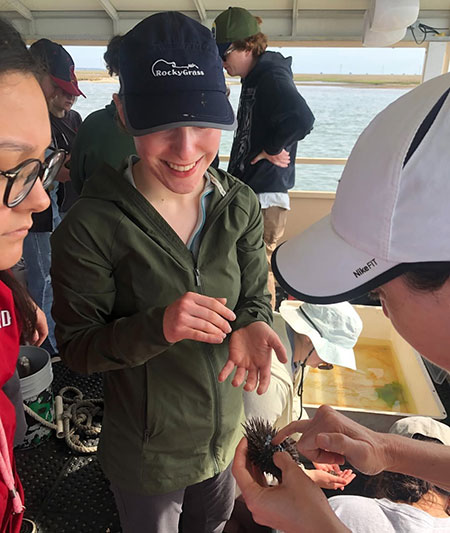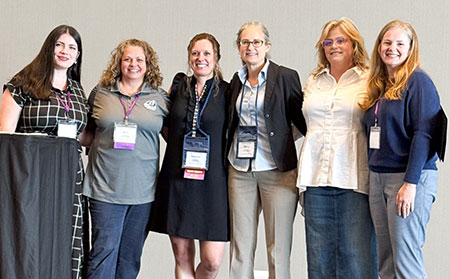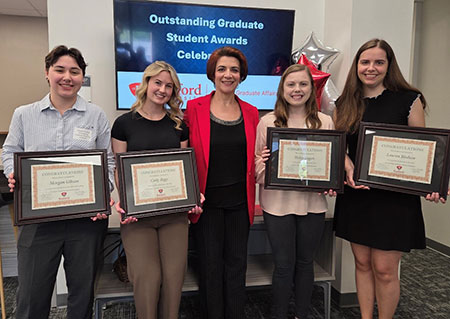Highlander Highlights: Week of May 5, 2025
Marine Biology class heads for the coast

Trading textbooks for trawling nets, students in Assistant Professor Melissa DeBiasse’s Marine Biology course took a field trip last month that was more stream than field.
Joined by Jamie Lau, associate professor and biology department chair, DeBiasse and 14 students traveled to Chincoteague Bay Field Station for a series of activities exploring marine ecosystems on the Virginia coast.
Their first day in the field – Friday, April 25 – the group trawled for marine life in Queen Sound. They found plenty: sea urchins, sea sponges, sea cucumbers, various crabs, coral skeletons and some other mollusks and gastropods. The rest of the weekend, the students toured the station’s research labs, kayaked through a coastal marsh, seined for fish on Assateague Island, sifted for sand-dwelling organisms and visited Wallops Island at a NASA launch site.
“This was my favorite undergraduate experience I have had at Radford University,” said Aidan Bridge, a chemistry major from Blacksburg, Virginia, and 2025 graduate, adding that it “has inspired me to pursue my interests in marine biology and marine policy graduate programs.”
Kara Ashworth, a biology major from Riner, Virginia, who’s graduating this week, also gave the trip a rave review: “It gave us hands-on experience and learning that was extremely helpful.”
For DeBiasse, the trip solved a thorny teaching problem: how to offer that hands-on experience at a university hundreds of miles inland. She credited Jessica Baker ’14, the department’s vivarium manager, for originally recommending the Chincoteague station.
The next challenge was funding; the department, Artis College and the Office of Undergraduate Research and Scholarship all contributed to keep the journey low- to no-cost for students and enabled an experience that couldn’t be replicated through videos or lectures.
“A couple of the students said, ‘Now that I’ve seen the habitats and seen the organisms, what we learned in class is clicking together and making sense,’” she said.
Marine Biology was presented as a special topics course. DeBiasse hopes the department can offer the course again, pending future funding.
Special education program recognized for excellence

Radford University’s special education program received the Exemplary Rural Special Education Award for Excellence in Preservice and Inservice Training from the American Council on Rural Special Education (ACRES).
The Radford recipients picked up the award at the ACRES annual conference, held April 3-4 in Virginia Beach, Virginia.
“This award showcases the dedication of the faculty in the special education program at Radford in preparing special educators to be student-centered, inclusive and effective instructors implementing evidence-based practices,” said Karen Douglas, professor and graduate coordinator of the special education program. “We are innovative with our course offerings and have created multiple pathways for individuals to gain a special education teaching license. We support current and aspiring special educators across the Commonwealth in meeting the needs of each exceptional student.”
Douglas noted that each area of Radford’s special education program, both the undergraduate and graduate levels, “demonstrates a significant impact on the preparation and mentorship of current and future rural special educators.”
Outstanding grad students honored

Radford’s top graduate scholars received recognition and prizes at the 2025 Outstanding Graduate Student Awards on April 18.
Selected by a panel of alumni and community leaders, the five winners received $750 and a framed certificate. Judges praised the impressive caliber of nominees, who each submitted a substantive package detailing their research, academic work and teaching where applicable.
“These students not only excel academically but also embody the spirit of service, leadership and innovation in their programs and professions,” said Provost Bethany Usher, who greeted students and opened the ceremony held at The HUB.
The winners were:
- Graduate Assistant: Rachel Cayton, Counselor Education, M.S.
- Graduate Teaching Assistant: Morgan Gibson, M.S., Crime Analysis
- Graduate Student: Lauren Bledsoe, Communication Sciences and Disorders, M.S.
- Graduate Teaching Fellow: Carly Riggs, Criminal Justice, M.S., Crime Analysis
- Doctoral Student: Haley Logan, Physical Therapy, D.P.T.